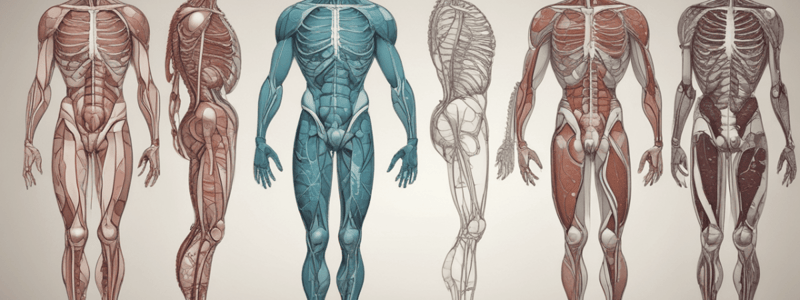Podcast
Questions and Answers
What is the main function of the stomach and intestines in the digestive system?
What is the main function of the stomach and intestines in the digestive system?
- To break down food into smaller molecules (correct)
- To absorb nutrients into the bloodstream
- To produce blood cells
- To eliminate waste from the body
What is the primary function of bones in the musculoskeletal system?
What is the primary function of bones in the musculoskeletal system?
- To send messages to the brain
- To protect internal organs from injury (correct)
- To support the body's movement
- To produce blood cells
What is the primary function of the respiratory system?
What is the primary function of the respiratory system?
- To deliver oxygen to the body's cells (correct)
- To control body movements and functions
- To digest food into nutrients
- To pump blood throughout the body
Which muscle is the largest in the human body?
Which muscle is the largest in the human body?
What is the role of nerves in the musculoskeletal system?
What is the role of nerves in the musculoskeletal system?
What is the role of the cardiovascular system?
What is the role of the cardiovascular system?
What is the final job of the digestive system?
What is the final job of the digestive system?
What is the function of nerves in the nervous system?
What is the function of nerves in the nervous system?
What is the role of the brain in the nervous system?
What is the role of the brain in the nervous system?
What do the ten body systems work together to do?
What do the ten body systems work together to do?
Flashcards are hidden until you start studying
Study Notes
Body Systems
- A system is a group of parts that work together to perform specific functions.
- The human body has ten different systems that work together to keep us healthy and functional.
Nervous System
- The nervous system consists of the brain, spinal cord, and nerves.
- The brain is the control center of the body, sending signals through the spinal cord to nerves all around the body.
- Nerves are cables that help move signals around to different parts of the body, controlling functions like breathing and blinking.
Respiratory System
- The respiratory system provides the body with oxygen through breathing.
- Air enters the nose and mouth, passes through the trachea in the throat, and enters the lungs.
- In the lungs, oxygen is transferred to the blood, which is then circulated throughout the body.
- Oxygen is essential for powering the body's functions.
Cardiovascular System
- The cardiovascular system consists of the heart and blood vessels (tubes that carry blood).
- The heart pumps blood throughout the body, delivering oxygen and nutrients and helping to protect against diseases.
- Blood vessels carry blood to all parts of the body.
Digestive System
- The digestive system breaks down food into nutrients, absorbs them, and eliminates waste.
- Major parts of the digestive system include the stomach and intestines.
- Nutrients are absorbed from food and circulated throughout the body, providing energy and essential substances.
Musculoskeletal System
- The musculoskeletal system consists of bones and muscles.
- Bones support the body, protect organs, and produce blood cells.
- Muscles are connected to bones, receiving messages from the brain through nerves, and facilitating movement by pulling on bones.
- The largest muscle in the body is the gluteus maximus, which is used for sitting.
Studying That Suits You
Use AI to generate personalized quizzes and flashcards to suit your learning preferences.




